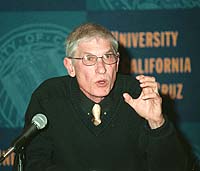January 17, 2005
Alan Richards briefs top brass at Pentagon's
Central Command
By Jennifer McNulty
At the invitation of high-level military intelligence officers,
UCSC professor Alan Richards briefed top Pentagon officials
last month about the sources of instability throughout the Middle
East and beyond.

Alan Richards was invited to talk
about "Long-term Sources of Instability in the Centcom
Region." Photo: Victor
Schiffrin, UCSC Photo Services
|
Richards, a professor of environmental studies and a critic
of Bush administration policy in the Middle East, flew to U.S.
Central Command in Tampa, Florida, to deliver two briefings
and meet with top brass during a whirlwind 24-hour trip.
Headquartered at MacDill Air Force Base, Central Command (Centcom)
controls U.S. combat forces in the Middle East. Centcom Commander
Gen. John Abizaid reports directly to Secretary of Defense Donald
Rumsfeld.
Richards was invited by the Commander's Advisory Group, which
consists primarily of intelligence officers, to discuss "Long-term
Sources of Instability in the Centcom Region," which extends
from the Horn of Africa to central Asia.
"They understand what a quagmire we're in and are bringing
in outsiders to articulate what they find it hard to say in
the current climate," said Richards, referring to "rampant
group think and the rigidity of military hierarchy."
With Abizaid in Iraq, Richards met with Deputy Commander Air
Force Lt. General Lance Smith, as well as members of his staff.
"Group think is always a problem, but I told them what
I thought, as best I could, in a way that I hoped they could
hear," said Richards, who summed up his analysis this way:
"It is not in our national interest to enrage the largest
generation of young Arabs and Muslims in history, which is what
we are now doing."
Two-thirds of the world's 300 million Muslims are under the
age of 30, according to Richards. High unemployment, coupled
with poor living conditions and corrupt leadership, has contributed
to widespread despair and anger that is being inflamed by Bush
administration policies, he said.
With little to lose, a generation of young Middle Eastern men
is embracing Islamic fundamentalism and its anti-American message,
said Richards.
Since before the war, Richards has taken every opportunity
to share his expertise with military and government officials,
briefing officers at the U.S. Army War College in Pennsylvania,
the U.S. Naval War College in Rhode Island, members of the intelligence
community in Washington, D.C., and many others.
In Tampa, officers from several other countries attended both
of Richards's briefings and asked pointed questions, he said.
"The most vocal were a Pakistani, a Saudi, and a Qatari,"
said Richards, noting that Australians, Italians, Canadians,
and Dutch also asked questions. "The Arabs were delighted
and relieved that I wasn't peddling the usual neoconservative
line."
Richards also dined with members of the Commander's Advisory
Group and referred to the trip as "a pretty intense 24
hours."
"The problem, of course, is that when the president has
it fundamentally wrong, and won't listen, what can you do?"
said Richards. "Still, it seemed like something worth doing."
Return to Front Page